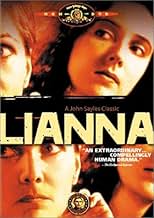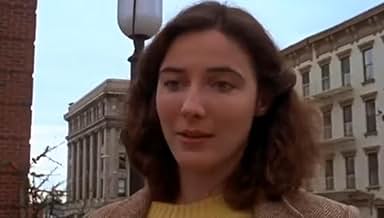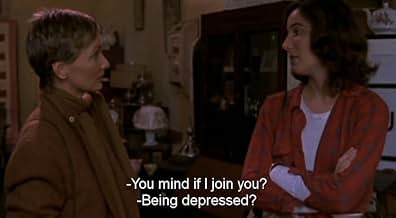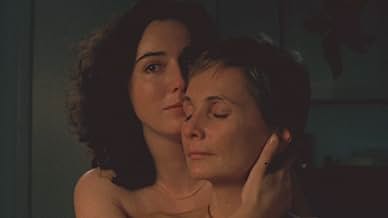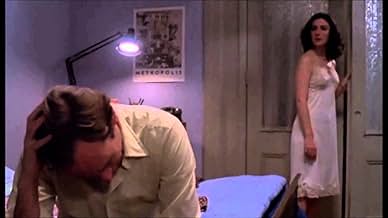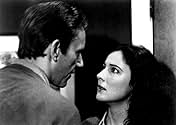VALUTAZIONE IMDb
6,9/10
1897
LA TUA VALUTAZIONE
Aggiungi una trama nella tua linguaA happily married woman comes to realize herself of being a repressed lesbian after she has an affair with a female college professor, and then tries to come to terms with her newfound lifes... Leggi tuttoA happily married woman comes to realize herself of being a repressed lesbian after she has an affair with a female college professor, and then tries to come to terms with her newfound lifestyle.A happily married woman comes to realize herself of being a repressed lesbian after she has an affair with a female college professor, and then tries to come to terms with her newfound lifestyle.
- Regia
- Sceneggiatura
- Star
Jessica MacDonald
- Theda
- (as Jessica Wight MacDonald)
Recensioni in evidenza
Writer/director John Sayles went with this film where few other directors would have dared to venture at that time. His Lianna is a film dealing with the coming out of a young woman in the midst of a failing marriage. Lianna is a 33 year old woman married to a self-centered college teacher and mother of two children. Though her family does not seem to greatly prosper, it would appear on the surface that Lianna lives a comfortable life. Just when her husband pushes things too far, Lianna starts up a sexual relationship with her night school teacher. Lianna cares enough for this woman that she becomes openly gay, and moves out of her home. She quickly learns that her coming out may cause more problems than she originally bargained for.
First of all, she is forced to live in a tiny apartment and financially support herself. The job market of this college town seems weak, and there isn't much out there in terms of decent employment. As one might expect, Lianna's children are somewhat alienated by their mother's new lifestyle. Their father no doubt helps further the alienation. Lianna's best friend no longer wishes to speak to her. And perhaps worst of all, the woman she came out for, does not wish to be committed to her. She has another woman in another town she is still very much in love with. The rest of the film deals with Lianna coming to terms with her new lifestyle, and trying her best to fight off her sudden loneliness and isolation.
John Sayles, who even plays a supporting part, does a very good job with the material. He had to make this film on a budget of less than half a million dollars, and all of that pretty much came from private donors. The film ends up looking pretty good, but many of the locations are somewhat bleak in appearance. Sayles handles perhaps the most important scene with very good tact. In it, Lianna is trying to come out to Ruth (the teacher) without actually saying it point blank. Ruth is clearly attracted to Lianna, but she obviously fears making a move before she is sure that's what Lianna wishes. Notice how she delicately moves her hand through Lianna's hair as Lianna details a close relationship with a female friend at summer camp. And yes, there are numerous sex scenes. On the surface, this type of film might sound like exploitation, but Sayles doesn't let it slip into that territory. He allows his characters to keep their dignity, and we the audience care deeply about them before its over.
The film is not necessarily about the triumphs and empowerment of coming out. Lianna in fact seems mostly miserable once she allows herself to be honest about her sexuality. That makes this film a somewhat depressing endeavor. Only in the film's final scene is there any sliver of hope that the protagonist can gain acceptance from someone was alienated by her change of lifestyle. The film stumbles a bit in terms of how it handles Lianna's relationship with her husband. He is shown to us as being a truly reprehensible slug from the beginning. I think it would have been more interesting to show him as being either likable or at the very worst simply inattentive. Being as though we already know what a jerk he is, there really isn't any where else the story can go with him. Maybe it would have been more interesting to show how a more typical man would have reacted to his wife coming out. Just a thought.
Overall this is a daring and thoughtful film. Linda Griffiths is particularly outstanding as the title character, and the rest of the cast is fairly convincing as well. The film scores points for dealing with its characters as well-defined individuals, rather than simple stereotypes. If you can find a copy of this little-known film, by all means give it a look. 8 of 10 stars.
The Hound.
First of all, she is forced to live in a tiny apartment and financially support herself. The job market of this college town seems weak, and there isn't much out there in terms of decent employment. As one might expect, Lianna's children are somewhat alienated by their mother's new lifestyle. Their father no doubt helps further the alienation. Lianna's best friend no longer wishes to speak to her. And perhaps worst of all, the woman she came out for, does not wish to be committed to her. She has another woman in another town she is still very much in love with. The rest of the film deals with Lianna coming to terms with her new lifestyle, and trying her best to fight off her sudden loneliness and isolation.
John Sayles, who even plays a supporting part, does a very good job with the material. He had to make this film on a budget of less than half a million dollars, and all of that pretty much came from private donors. The film ends up looking pretty good, but many of the locations are somewhat bleak in appearance. Sayles handles perhaps the most important scene with very good tact. In it, Lianna is trying to come out to Ruth (the teacher) without actually saying it point blank. Ruth is clearly attracted to Lianna, but she obviously fears making a move before she is sure that's what Lianna wishes. Notice how she delicately moves her hand through Lianna's hair as Lianna details a close relationship with a female friend at summer camp. And yes, there are numerous sex scenes. On the surface, this type of film might sound like exploitation, but Sayles doesn't let it slip into that territory. He allows his characters to keep their dignity, and we the audience care deeply about them before its over.
The film is not necessarily about the triumphs and empowerment of coming out. Lianna in fact seems mostly miserable once she allows herself to be honest about her sexuality. That makes this film a somewhat depressing endeavor. Only in the film's final scene is there any sliver of hope that the protagonist can gain acceptance from someone was alienated by her change of lifestyle. The film stumbles a bit in terms of how it handles Lianna's relationship with her husband. He is shown to us as being a truly reprehensible slug from the beginning. I think it would have been more interesting to show him as being either likable or at the very worst simply inattentive. Being as though we already know what a jerk he is, there really isn't any where else the story can go with him. Maybe it would have been more interesting to show how a more typical man would have reacted to his wife coming out. Just a thought.
Overall this is a daring and thoughtful film. Linda Griffiths is particularly outstanding as the title character, and the rest of the cast is fairly convincing as well. The film scores points for dealing with its characters as well-defined individuals, rather than simple stereotypes. If you can find a copy of this little-known film, by all means give it a look. 8 of 10 stars.
The Hound.
Linda Griffiths ('Overdrawn at the Memory Bank') plays the title character, a wife & mom unhappily married to unfaithful film professor Dick (Jon DeVries, "American Gangster"). She's long suppressed what turn out to be lesbian tendencies, only fully accepting this once she embarks upon a relationship with Ruth (Jane Hallaren, "Body Heat"), her child psychology professor. Naturally, this causes various problems in her formerly staid existence.
Writer / director / editor and indie favorite John Sayles was ahead of the curve here in his effort to tell a mature story of a lesbian romance, and his script is notably intelligent and compassionate. As always, he has a great ear for dialogue, and there are some very funny lines along the way. (Per his style, he gives himself an amusing supporting role as the character Jerry.) Moreover, the whole story is *believable*, and the characters come off as real, multi-dimensional people.
This little film is well cast right down the line, even if much of the cast are not exactly big names. Griffiths & Hallaren are wonderful in the leads, and Jo Henderson ('Search for Tomorrow') is likewise engaging as Liannas' good friend Sandy, who admits to being uncomfortable about Liannas' coming out, but who still intends to be the best friend that she can be. A young Chris Elliott ('Get a Life') made his film debut here, in a small role as a lighting technician.
Ultimately a sensitive tale of one womans' journey towards self-discovery, "Lianna" is one of those pictures that discerning viewers can't afford to miss.
Eight out of 10.
Writer / director / editor and indie favorite John Sayles was ahead of the curve here in his effort to tell a mature story of a lesbian romance, and his script is notably intelligent and compassionate. As always, he has a great ear for dialogue, and there are some very funny lines along the way. (Per his style, he gives himself an amusing supporting role as the character Jerry.) Moreover, the whole story is *believable*, and the characters come off as real, multi-dimensional people.
This little film is well cast right down the line, even if much of the cast are not exactly big names. Griffiths & Hallaren are wonderful in the leads, and Jo Henderson ('Search for Tomorrow') is likewise engaging as Liannas' good friend Sandy, who admits to being uncomfortable about Liannas' coming out, but who still intends to be the best friend that she can be. A young Chris Elliott ('Get a Life') made his film debut here, in a small role as a lighting technician.
Ultimately a sensitive tale of one womans' journey towards self-discovery, "Lianna" is one of those pictures that discerning viewers can't afford to miss.
Eight out of 10.
When John Sayles makes a film, it's usually because he has a very good reason. A man who's made his life in film averting the Hollywood approach, Sayles stories are densely layered character dramas, unencumbered with camera tricks, special effects, or deception.
The idea that Lianna (Linda Griffiths) needs a change of life in and of itself is not surprising. As a young college student, she had succumbed to the advances of one of her professors, then quit school to marry him. Now, twelve years and two children later she finds her life mundane, and loveless. She needs a change.
A John Sayles film is a personal experience. He leads us down a road deluged with emotion, conflict and only some spattering of resolve. The rest he leaves for us. Sometimes we have to fill in the blanks to even the most difficult questions posed. And there's nothing wrong with that.
The idea that Lianna (Linda Griffiths) needs a change of life in and of itself is not surprising. As a young college student, she had succumbed to the advances of one of her professors, then quit school to marry him. Now, twelve years and two children later she finds her life mundane, and loveless. She needs a change.
A John Sayles film is a personal experience. He leads us down a road deluged with emotion, conflict and only some spattering of resolve. The rest he leaves for us. Sometimes we have to fill in the blanks to even the most difficult questions posed. And there's nothing wrong with that.
Lianna (Rachel Griffiths) is unhappily married to a cheating husband (John De Vries) and has two children. She falls for a female teacher (Jane Hallaren) and realizes she's a lesbian. She starts an affair with her and realizes she can't stay with her husband...she must find her own identity as a lesbian.
It's hard to believe this was made in 1983. Definitely a ground breaker. I remember it played forever in a small art house cinema in Cambridge MA. I didn't see it back then but I'm glad I got the chance. BTW, it was beautifully restored in 2003 and that's the print I saw. John Sayles wrote and directed the film and, like all his films, it has incredible dialogue and a believable script. This is probably the first realistic film to show a woman coming to grips with her sexual orientation--and embracing it completely. It does show the hardships she goes through adjusting to a life on her own and the relationship problems--but that's very true to life. The trip to a lesbian bar was surprising in a film this old. The acting by the leads is superb--Griffiths is perfect and Hallaren matches her. De Vries is good also but he's stuck with a 1 dimensional villain role. The supporting roles are somewhat amateurish--but they don't lessen the film. In fact it makes it seem even more realistic! The sex scenes are explicit but tasteful.
It's hard to believe a man wrote and directed such a sensitive portrayal of a woman. My only complaint is that it's a bit overlong--but this still should be seen. A groundbreaking and very honest film. An 8 all the way.
It's hard to believe this was made in 1983. Definitely a ground breaker. I remember it played forever in a small art house cinema in Cambridge MA. I didn't see it back then but I'm glad I got the chance. BTW, it was beautifully restored in 2003 and that's the print I saw. John Sayles wrote and directed the film and, like all his films, it has incredible dialogue and a believable script. This is probably the first realistic film to show a woman coming to grips with her sexual orientation--and embracing it completely. It does show the hardships she goes through adjusting to a life on her own and the relationship problems--but that's very true to life. The trip to a lesbian bar was surprising in a film this old. The acting by the leads is superb--Griffiths is perfect and Hallaren matches her. De Vries is good also but he's stuck with a 1 dimensional villain role. The supporting roles are somewhat amateurish--but they don't lessen the film. In fact it makes it seem even more realistic! The sex scenes are explicit but tasteful.
It's hard to believe a man wrote and directed such a sensitive portrayal of a woman. My only complaint is that it's a bit overlong--but this still should be seen. A groundbreaking and very honest film. An 8 all the way.
The previous review did a great job in outlining the movie.
One additional comment: This movie joints "Desert Hearts" and "If these walls could talk 2" in the pantheon of movies with the best romantic scenes between women.
One additional comment: This movie joints "Desert Hearts" and "If these walls could talk 2" in the pantheon of movies with the best romantic scenes between women.
Lo sapevi?
- QuizJohn Sayles had written the screenplay for this film before writing the screenplay for his debut film, Return of the Secaucus Seven (1979). Sayles failed to get funding for a film about a lesbian love affair in the 1970s, and those who felt comfortable with the material were not comfortable with the film being directed by a man. So, Sayles put the Lianna: un amore diverso (1983) screenplay on hold until gaining success with his two first films, Return of the Secaucus Seven (1979) and Promesse, promesse (1983).
- Curiosità sui creditiThe opening credits credit only the production company and the crew members. The cast is not credited until the end credits. The title of the film, LIANNA, appears as the last title card after John Sayles is credited as writer, producer, director and editor.
- ConnessioniFeatured in Lo schermo velato (1995)
I più visti
Accedi per valutare e creare un elenco di titoli salvati per ottenere consigli personalizzati
- How long is Lianna?Powered by Alexa
Dettagli
Botteghino
- Budget
- 300.000 USD (previsto)
- Lordo Stati Uniti e Canada
- 1.530.839 USD
- Lordo in tutto il mondo
- 1.530.839 USD
Contribuisci a questa pagina
Suggerisci una modifica o aggiungi i contenuti mancanti

Divario superiore
By what name was Lianna: un amore diverso (1983) officially released in Canada in English?
Rispondi
